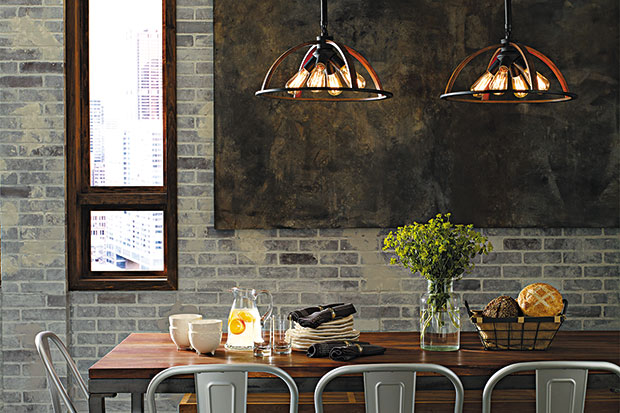As more of life is centered around home, good design can help you augment and replace natural light, while creating a beautiful, productive, safe haven during the darker, shorter days of fall and winter.
“As the home continues to serve as our collective sanctuary during the COVID pandemic, it’s critical to consider how lighting can keep a family thriving during this fall and winter season,” says Michael McCullough, director of PR at Progress Lighting.
Fall has arrived, and with it, a new reality. The days are naturally growing shorter and darker.
“The stress of the COVID-19 crisis has emphasized the impact our environment plays on our well-being.
There’s never been a more important time for interior design,” says Doris Pearl-man, founder of Possibilities for Design of Denver. “Our goal is to create spaces that uplift and embrace, providing respite from daily pressures.”
Pearlman’s team offers these design suggestions:
• Add lighting above work areas to create functional, operational spaces.
• Complement ambient lighting with pendant lighting around kitchen islands to facilitate collaboration.
• Create inspiration by clustering pendants for a fun, unique centerpiece.
• Hang pendants over nightstands to turn the bedroom into a retreat. Individual switches allow for customized lighting for easy bedtime reading.
Jayme and Nolan Fridley, of Fridley Homes in Oregon, who balance a busy custom home-building business with their active family, are observing new trends.
“The open-concept floor plan is not as charming when everyone’s working from home,” says Jayme Fridley.
Fridley’s strategies include:
• Create specific learning areas for each child.
• Let kids customize spaces, keeping clutter minimized to avoid distractions.
• Encourage concentration with good (if possible, natural) lighting.
Design pros suggest homeowners incorporate light layering to maximize light throughout the day. Supplement daylight with overhead lighting from chandeliers, and recessed and close-to-ceiling fixtures.
Place task lighting such as pendants or desk lamps over work areas. Use accent lighting like wall sconces to add a soft glow as the day wanes.
“Lighting should set the tone for productivity. For some, this might mean bright lighting and multiple sources. Others might prefer a moody vibe. Making it your own is what’s most important,” says Julie Wynalda, owner of True Vine Creations in Hudsonville, Michigan.
Instagram influencer Heather, of Operation Tudor Revival, who’s DIY-ing her home renovation, says, “Office lighting can be both functional and fabulous! I went with an overhead chandelier with a drum shade for an updated look. The shade also helps diffuse light to avoid glare on my computer screen.”
Technology can help spaces pull double-duty. Lifestyle blogger Lindsey Dalton says, “We put our chandelier on a dimmer so it can be bright while my husband’s working, but we can turn it down during dinner to transition the room from workday to relaxing evening.”
With smart light fixtures, you can change lighting tone, brightness and color with a device or your voice. Control products from iDevices work with the three most popular voice assistants: Amazon Alexa, Google Assistant and Siri. Using the iDevices smart dimmer switch and wall switch, you can set lights on dynamic schedules and automations based on triggers, like your local sunrise or presence at home.
Delineating start and stop times to your day through lighting can help optimize productivity and boost your mood. Smart controls can also facilitate distance-learning.
“With a voice assistant built inside the Instinct smart light switch, you have your own at-home teaching assistant, helping answer questions and assisting with exercises,” says Andrew Ragali, senior marketing manager for iDevices. “It also allows you to play music or audiobooks using voice commands to keep kids on task.”
This article is courtesy of StatePoint Media.
